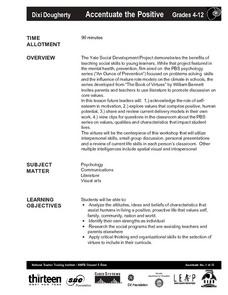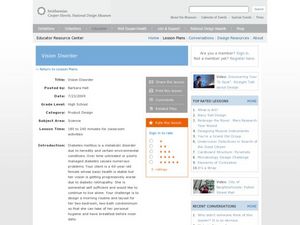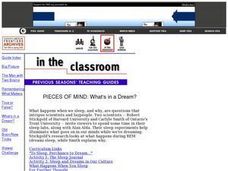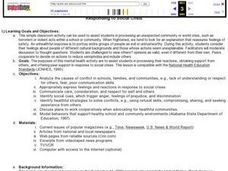Curated OER
Left Brain vs. Right Brain -- Which Side Are You On?
High schoolers examine the different regions of the brain and what they are responsible for. They decide whether they are right or left- brain dominant based on their personalities.
Curated OER
Mediation/Conciliation
Twelfth graders discuss the court system in Japan, and assume roles of family members and friends of air crash victims. They discuss whether they would file suit against airlines, compare methods of achieving justice in United States and...
Curated OER
Accentuate the Positive
Students analyze the attitudes, ideas and beliefs of characteristics that
assist humans in living a positive, proactive life that values self,
family, community, nation and world. Students identify their own strengths as individual....
Curated OER
Life of a Soldier after the Civil War Lesson Plan: What's in a Name
Students explore the concept of institutional bias. In this Civil War lesson, students read case studies on the treatment of Irish and African-American veterans who did not receive their pensions from the war. Students discuss their...
Curated OER
Brothers in Hope
Students demonstrate their understanding of a book read in class. In this reading comprehension lesson, students participate in a process drama led by their teacher in order to demonstrate their understanding of the book "The Lost Boys...
Curated OER
Take a Second. Make a Difference
Students are taught an important lesson about how an adult can influence life in a positive or negative way. They are encouraged to accomplish their best at home and school. The students write a personal story about a special person that...
Curated OER
The Human Memory
This is a well-designed, creative lesson to help students learn more about the human memory. Working in pairs, students complete tasks and gather data. Excellent websites for resources are also provided.
Curated OER
Growing on My Own, Kids on the Grow
Students participate in an after school program that promotes critical thinking, concern for others, recognizing differences, accepting differences, self-motivation and personal safety. They cover how kids develop, expressing different...
Curated OER
Self Acceptance
Sixth graders brainstorm their strengths and the positive qualities that make them unique. They write their own short story in prose.
Curated OER
Create the Ideal City
Students examine the significance of city planning. They analyze maps, develop a crossword puzzle using vocabulary terms, and create a diagram of an ideal city and describe the features that make it healthy for the economy, the...
Curated OER
Government Policy and Its Impact on HIV/AIDS
Students examine "President Bush's Emergency Plan for AIDS Relief", identify important U.S. policy events related to AIDS/HIV from the last 25 years and hold a policy debate on the funding for AIDS/HIV programs.
Curated OER
Going to Extremes: High Anxiety
Students examine the dangers of mountain climbing. After watching a video, they discuss the role of a German research team going into the Alps to predict who is going to adjust to the change in oxygen levels. They discover the...
Curated OER
Growing in Communities, Kids on the Grow
Students participate in an after school program that promotes concern for others, recognizing differences, accepting differences, leadership roles, mentoring, self-responsibility and personal safety. They explore the diversity of their...
Curated OER
Dorothea Dix: Reform in Massachusetts
Students examine the life and reform efforts of Dorothea Dix on behalf of people with disabilities. They discover how her efforts resulted in the passage of legislation. They also examine the care people with disabilities receive.
Curated OER
Vision Disorder
Pupils design a morning routine for a 60 year old female senior with vision disorder. In this biology lesson, students collaborate with their team to come up with possible solutions. They present at least two ideas of their design to the...
Curated OER
A Woman's Crusade: Dorothea Dix
Students examine the life and reform efforts of Dorothea Dix on behalf of people with disabilities. They also examine the role of women in the 1840s and 1850s. They discover different sources of examples of citizen's rights.
Curated OER
The Duties of Governments: Dix vs. Pierce
Students examine the role of Dorothea Dix on behalf of people with disabilities. They discuss President Pierce's veto of legislation she helped create. They address the rights and responsibilities of citizen's and the role of government.
Curated OER
Infectious Disease Detectives
Learners participate in a simulation of how diseases are transmitted. Each student holds a test tube, with only one containing the "disease" while the others have water. They move around the room until told to stop. Using droppers to...
Curated OER
How Can You Predict the Characteristics of an Unborn Baby?
Students compare three sets of unlabeled human chromosomes and gather related data, trace chromosomes to pair them, and make observations about them.
Curated OER
How Machines Help Us Stay Healthy
Students visit different departments at a local hospital to see how machines help peoples such as the CAT scan machine. They build a model of such a machine that shows how patients are moved in and out of the machine.
Curated OER
Pieces of Mind: What's In A Dream?
Students explore the five stages of sleep. They view video footage of sleep labs and discuss the findings. Students conduct experiments by keeping a sleep journal to track their sleep and dream activity. They find examples of ways...
Curated OER
Sports Science
Young scholars explore athletes and how they perform. In this physics lesson, students investigate how physics is involved in sports. Young scholars go online to interactive sites that explain physics and biomechanics. Students also...
Curated OER
Food Math
Fourth graders explore healthy habits by completing caloric measurement activities. In this food choice lesson plan, 4th graders discuss what types of foods give you protein or fat and utilize a food chart to measure caloric intake....
Curated OER
Responding to Social Crisis
Students, through discussion, identify ways to cope with and process unexpected community or world crisis, such as terrorism or violent acts within a school or community.

























